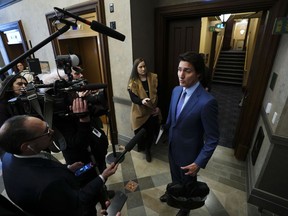Offer will include immediate and unconditional top-up of $2 billion to ease intense pressure on hospitals
Author of the article:
Canadian Press
Laura Osman, Mia Rabson, Stephanie Taylor and Mickey Djuric

OTTAWA — Prime Minister Justin Trudeau says his government will increase federal health-care transfers to the provinces by $196 billion over the next 10 years, though only about one-quarter of that is new, previously unexpected money.
Trudeau is making the offer to the premiers today at a meeting in Ottawa and says it will include an immediate and unconditional top-up of $2 billion to the Canada Health Transfer to ease the intense pressure on Canada’s hospitals.
From our newsroom to your inbox at noon, the latest headlines, stories, opinion and photos from the Toronto Sun.
Thanks for signing up!
A welcome email is on its way. If you don't see it, please check your junk folder.
The next issue of Your Midday Sun will soon be in your inbox.
Ahead of Tuesday’s meeting, Manitoba Premier Heather Stefanson said provincial and territorial leaders are “open-minded,” as long as the prime minister’s offer includes more baseline funding for health care.
“I think one of the things that we’ve been very consistent on all the way through this is to ensure that we have predictable and stable long-term funding put into the baseline of the Canada Health Transfer,” said Stefanson, who chairs the premiers’ group known as the Council of the Federation.
Quebec Premier Francois Legault said he will be looking for flexibility as part of those one-on-one deals.
Premiers have staunchly resisted federally dictated conditions on new health-care funding for years, but that stance has softened over the last few weeks.
Legault said he wants the money to finance the province’s existing health-care plans but some of Ottawa’s priorities overlap with Quebec’s, such as the need for more family doctors and improvements to long-term care.
It’s important that provinces to be able to “use the money the way we want to use it,” he said at a press conference with Stefanson Tuesday morning.
The provincial and federal governments are unlikely to come to an agreement Tuesday, and have characterized the meeting as a first step in the negotiations.
Canada needs immediate health-care support, as well as a more modern system that will respond to the challenges of the future, Trudeau said on his way into the meeting with the premiers.
Those challenges include an aging population with more chronic diseases and a large number of health workers reaching retirement age, Health Minister Jean-Yves Duclos said. “We need to prepare for the future in addition to repairing the damage caused by COVID-19.”
Earlier in the day, Trudeau said Canada’s health-care system is not working as well as it should and that has to change.
On his way into a morning cabinet meeting, he said the federal government will be “investing significantly” to upgrade the system.
Canadians are proud of the public health-care system in this country, Trudeau said, but it needs work.
“We all have to recognize it hasn’t been delivering at the level that Canadians would expect,” he said.
“We will be stepping up with even more funding.”
NDP Leader Jagmeet Singh said the federal government must ink a condition to address health-care staff shortages into the agreement with provinces.
As the premiers arrived at the meeting with the prime minister, Singh addressed a crowd of health-worker unions and associations on Parliament Hill. He told them it was time to send a message to the Liberal government and Conservative premiers to spend more money on their health systems.
Arriving for Tuesday’s talks, Newfoundland and Labrador Premier Andrew Furey told reporters he’s anxious to see a deal, and suggested he and his provincial colleagues are entering the meeting with a sense of practicality.
“Whenever you’re discussing from a negotiating perspective there’s riverbanks, and there has to be some diplomacy,” he said.
“There has to be a healthy dose of pragmatism.”
Alberta Premier Danielle Smith said she felt “upbeat” about the impending offer and expressed openness to striking a one-off deal with Ottawa.
On Tuesday, Trudeau cited getting more family doctors, shorter waiting lists, support to recruit and retrain workers and improving mental health care as some of those possible areas.
The federal government is also insisting the provinces agree to overhaul their health system data collection so patients’ medical records are more complete and accessible across provinces and to multiple health professionals, and so governments can better see where problems exist.
The premiers have been in Ottawa since Monday, meeting on their own at a downtown hotel, and aim to have a unified front when they sit down with Trudeau. They said they are going into the talks with an open mind, no red line and a willingness to sign one-on-one agreements with Ottawa.
British Columbia Premier David Eby says bilateral agreements will be a big part of the negotiations, but the core goal is to get Canadians the health care they deserve.
The Canada Health Transfer is currently set to rise to $49.4 billion in 2023-24, a nine-per-cent increase over this year, which is twice the average annual increase over the last six years.


